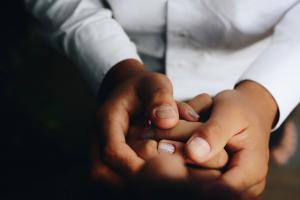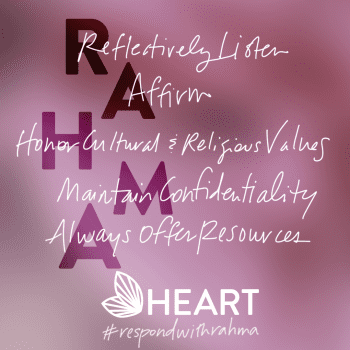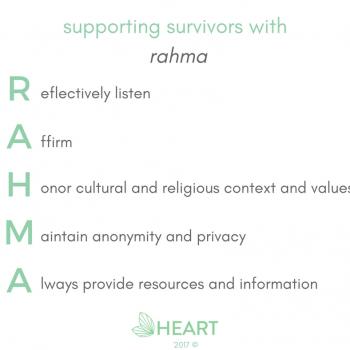* Trigger warning for sexual assault and explicit descriptions
We welcome a guest writer who shares an important reflection of navigating her sexual trauma in her marriage, and what it means to have partners who #respondwithrahma.
by Anonymous

It is a question I repeatedly asked myself from the time that the first of a line of sexual predators spanning my young life groomed me at 11—how do I keep past sexual abuse from wrecking my sensual present?
Similar to many survivors, each sexual abuse experience left a spectral trail of memories permeating every nerve in my body. The majority of the time, the phantoms remain dormant, but when presented the right trigger, they awaken nightmarish trauma that I’m forced to relive.
Consequently, I experienced many triggers during adult sexual interactions. Although the sex was consensual, that didn’t prevent my body from negatively responding to the wrong touch, environment or verbal cues. If one manifested, any pleasure I may have felt ended—and I’d shut down. I would also avoid future attempts for sexual gratification, which frustrated my partner.
After I converted and subsequently married, the pattern extended into my Muslim life Our marriage bed, blessed with Allah’s sanction to find satisfaction in each other, was a space of vulnerability for me. As we learned and explored, there were times that my spouse unwittingly tapped into the phantoms of my abuse.
At the uttering of certain sensual words, the hairs at the back of my neck stood on end, and I’d hear the grunts of how I “wanted it” from my date as he tore his penis into me. A seductive clasp of my wrist made my lungs constrict the same way they did when my best friend helped two boys pin me down in the grass and try to tear off my panties. Caressing me while I slept caused my muscles to contract as if I was once again waking underneath a drunk molester, filled with terror.
My subsequent rejection to his perfectly acceptable advances filled my husband with confusion and created a barrier between us that threatened to destroy our marriage. During those times, I was overwhelmed with guilt. I couldn’t function as a committed sexual partner, and accompanying anxieties from reemerging trauma exacerbated. I spent the first few years of our marriage vacillating between the ardent desire for the man I loved infused in every fiber of my being and the phantoms of abusers meandering through me.
It wasn’t until my husband offered a safe space for me to reveal my trauma that I acquired the ability to connect past trauma with present sexual anguish and confusion. I sought professional help and developed how I conveyed my needs to my husband as my sexual partner. I became comfortable with frank talk and constructing parameters for intimacy. Alhamdulillah, frequency of triggers lessened, and both our confidence grew.
Post-Sexual Trauma Intimacy
Sexual trauma doesn’t just evaporate. There are frequently long-term physical, physiological and emotional effects. Not all survivors cease being sexual beings with libidos and desires.
Sarah Ogden Trotta asserts: “We have a shared social stereotype about sex as impossible after rape. We like to think of sexual assault survivors as broken and damaged and unable to ever function ‘normally’ in any way, especially sexually.”
Sexual trauma will affect intimacy but not necessarily extinguish it. Consequently, there needs to be support for survivors to understand the impact of sexual abuse on their approach to and engagement in intimate exchanges.
Post-sexual trauma intimacy is infrequently discussed in spheres of survival for several reasons. In valor attempts to assist survivors with navigating through immediate and post-traumatic pain and stress, there is an apparent short-sightedness in anticipating that a survivor will once again be a part of sexual conversations and interactions.
While some survivors may reduce sexual activities, it may increase for others. Understanding the underlying factors contributing to decisions about traversing or avoiding encounters is critical to promoting sexual soundness.
Additionally, there needs to be resources for partners of survivors to help them negotiate sexual conversations and interactions in a manner that doesn’t antagonize trauma-associated triggers.
Sexual Desire
Islamic scholarship addresses innate sexual desire as endowed and legislated by Allah:
“The first thing Allah created from the human being was his private parts, then He said, ‘This is my trust to you [i.e. Adam], so do not use it except for its right.**”
Human inclination towards desire varies individually and throughout one’s life. It can also be influenced by different factors, including sexual abuse. However, the divine design of desire should not be ignored by Muslims.
Therefore, it is not incredible to consider creating a means for survivors and their partners to create positive sexual interactions and attain satisfaction by a means that is pleasing to The Creator.
**As-Suyuti as cited in Akande, H., & In Clarke, A. (2015). A taste of honey: Sexuality and erotology in Islam. p. 55.












